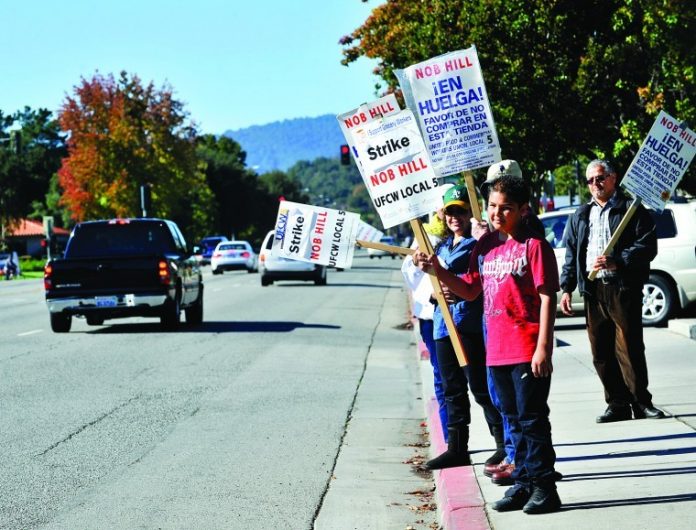
UPDATE:
The strike against Raley’s and Nob Hill stores ended Tuesday when a tentative agreement was reached between Raley’s management and union members.
All picket lines were ordered to be immediately withdrawn Tuesday morning, according to spokesman Mike Henneberry with United Food and Commercial Worker.
Details of the agreement have not been released because union members will vote on the agreement before its contents are made public. Both parties have said they are “very happy” with it, however.
Henneberry did say that Raley’s/Nob Hill agreed to remain a part of the union’s health and benefits plan – the same plan that was approved by Safeway last week.
Gilroy’s Nob Hill is back to business as usual, according to Raley’s spokesman John Segale.
Segale described the agreement as a “middle ground” and a “very fair contract for both parties.”
“We are very pleased with the agreement, it provides us with the cost savings we needed so we can compete and be more effective,” he said.
Segale said that business went up immediately after the picket line came down on Tuesday.
“People were really torn about this strike,” he said. “They were torn because they know what Raley’s and Nob Hill does in their local community, as well as knowing their clerks and checkout people.”
The union has not set a date for its members to vote on the contract, but the union is recommending members vote in favor of it.
The strike settlement guaranteed that when workers return to their jobs there will be no reprisal for exercising their rights. They will maintain their positions, seniority and health care eligibility, according to a press release from UFCW.
“The strike is behind us and the healing process began immediately after it ended. Now everyone is working together for the common objective for the company,” Segale said.
After 15 months of unsuccessful negotiations with the company, employees from the 90-store California chain of Raley’s, Bel Air and Nob Hill walked off their jobs Sunday, Nov. 4., claiming the company was using unfair tactics to cut their retirement and health benefits.
For nine full days, 90 percent of Gilroy’s Nob Hill staff took shifts lining the parking lot and entrance to Nob Hill in Gilroy.
To offset the strike, the Gilroy store hired 33 temporary workers and enticed shoppers who may have been hesitant to cross the picket line with doorbuster sales, according to Gilroy’s Head Cashier Ernie Gonzalez.
The strike marked the first major union discord with Raley’s, Henneberry said.
Earlier story from last week:
Nob Hill executives have re-entered negotiations with union representatives a week after grocery store employees walked off their jobs in protest, but the strikers in Morgan Hill said they remain unwilling to give up a portion of their wages and benefits in exchange for the right to blow up balloons at work.
In fairness, that’s not all that the Raley’s company – which owns Nob Hill stores – offered in return for their employees giving up some of their current benefits and the right to organize in the future. In addition to allowing courtesy clerks to inflate balloons and conduct food sampling demonstrations, Raley’s has also offered to post weekly work schedules by noon on Wednesdays. Unionized employees who are striking until the company makes a better offer say these are paltry concessions and are not worth the financial impact on current and future employees – as well as current and future retirees – and their families.
“They want to take away our right to organize in a couple of years,” said Carlos Hernandez, 50, a produce clerk at the Nob Hill store at Vineyard Town Center in Morgan Hill, finishing off the union’s list of grievances with Raley’s final offer. “If we do that, we’ll have no rights. Eventually, if we give up our rights to organize, we won’t have a voice anymore.”
Hernandez has worked for the Nob Hill company for 27 years, which includes 12 years at the Morgan Hill store. His wife works at Nob Hill on First Street in Gilroy, and Hernandez said many of the company’s employees have worked there for decades.
Hernandez stood outside the store Monday morning with about 30 of his co-workers and some of their children, displaying signs of protest against Nob Hill’s management team and asking customers not to cross the picket line.
Raley’s initiated new negotiations with representatives of the United Food and Commercial Workers union Sunday night, and continued throughout Monday. No deal was reached as of press time.
After 15 months of unsuccessful negotiations with the company, employees from the 90-store California chain of Raley’s, Bel Air and Nob Hill walked off their jobs Sunday, Nov. 4.
Union employees claim that the company is using unfair tactics to reduce their healthcare and retirement benefits, while the company maintains that the only change to the new benefits package is a two-year wage freeze and the elimination of premium pay for Sundays and holidays.
“We’re under severe competition. We’ve got to lower our operating costs so we can be more effective,” said John Segale, Nob Hill/Raley’s spokesman.
Safeway, which had also been in negotiations for several months, reached an agreement with the union Nov. 8., leaving Raley’s as the isolated grocer in California in the midst of a union dispute.
Mike Henneberry, spokesman for the United Food and Commercial Worker Local 5, said that Safeway’s deal could have a direct impact on Raley’s by pushing them to come to a more union-friendly agreement.
“Safeway’s deal was of a high enough merit that we recommend it, as far as their commitment to benefits and wages,” Henneberry said.
But Segale insisted that Safeway’s deal has had no impact on Raley’s/Nob Hill.
Some of the concessions Raley’s is seeking from employees might not sound like much, but for the employees the impact is significant, according to protesters. For example, the loss of Sunday pay will cost some employees up to $4,000 in wages annually.
Picketers in Morgan Hill said they have noticed a decline in customers visiting the store since the strike started Nov. 4. They have seen hardly any regular customers over the past week, and the shoppers who have crossed the picket line are unfamiliar to them.
Store Director Augie Rodriguez with the Morgan Hill Nob Hill, which opened in 1985, said sales are down “as expected” since the strike started, but he didn’t say by how much. Rodriguez, who is not a union member, said some of the customers are unhappy with their treatment by the protesters as they walked into the store.
“We still have to take care of our customers,” Rodriguez said.
To entice customers back who may have been hesitant to cross the picket line, the store has offered new promotions every three days. Any shopper who spent $20 in the store during the past week was rewarded with four free items such as orange juice, an avocado, a dozen eggs or bananas.
The current three-day sale offers shoppers free flour and a case of water with any $20 purchase.
Segale said the promotions have been “very successful.”
Of the 77 unionized employees at the Morgan Hill store, nine crossed the picket line and continue to work through the negotiations, according to protester Shyliene Hunt, 34, a 17-year employee of the Morgan Hill store.
“It’s a personal choice, but it does feel hurtful they’re not out here fighting with us,” Hunt said.
Hunt is striking not only for herself and her co-workers, but for her family which includes numerous current and retired Nob Hill employees – including her parents, step-father, step-mother, aunts, uncles and cousins.
“(The store) is pulling the rug out from under them,” said Hunt, a scanning coordinator at the Morgan Hill Nob Hill store. “My parents have been here for 35 years, and they thought they had a plan for retirement. But I’m out here for my co-workers as well. This is a family. I see them every day.”
The strike convinced at least one Nob Hill customer not to patronize the store. Todd Abbey, 43 of Morgan Hill, is a member of the Local 393 Plumbers, Steamfitters and Refrigeration Fitters Union, and he is currently working on the new 49ers stadium under construction in Santa Clara.
Abbey was walking by with his daughter when he engaged the protesters in a discussion about the dispute with their employer, and then continued walking past the store.
“I shop here on occasion, but I would never cross the picket line,” Abbey said. “It’s for solidarity – we’ve all got to stand up for ourselves. I support their cause. They’re striking for peanuts, but they’re standing up for it.”
Another striker said that while Raley’s executives continue to point out comparisons that show their offer is better than the union’s contracts with competing grocery store chains, they’re not giving in.
“They say the employees are the ‘greatest asset’ of this company,” said Ed Olvera, 58, a 40-year employee of Nob Hill who is currently putting his two kids through college. “If we are, why are we being thrown under the bus. We’re not asking for raises – we’re just asking to keep what we have. We don’t feel like an asset.”







